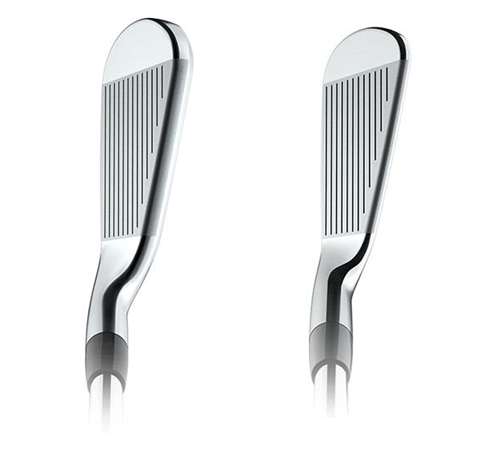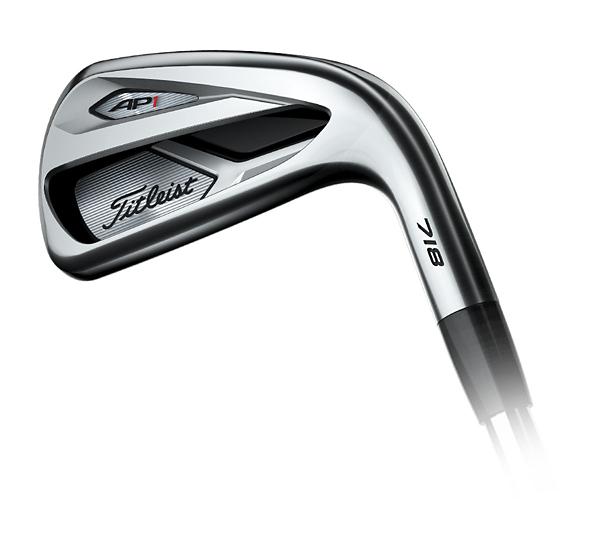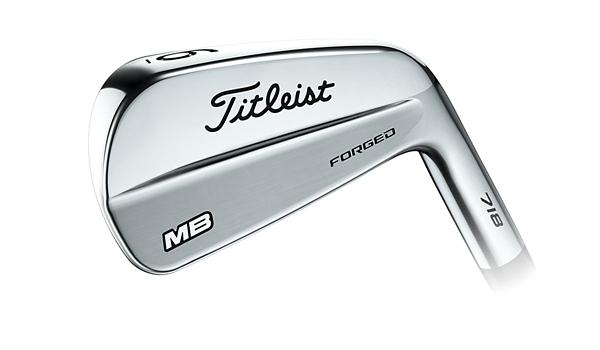Blade vs. Cavity-Backed Irons
There is nothing that compares to the look of sleek and smooth blades in your golf bag. Yet, we all know there is more consistency and forgiveness to be had with cavity-backed and hybrid irons. How much assistance does a cavity-backed iron really offer? To find out, we compared the Titleist 718 AP1 cavity-backed irons to the Titleist 718 MB blade iron.

Research:
There are multiple types of irons. The most common types are cavity-backed, muscle-backed, and hybrid irons. Cavity-backed and hybrid irons are categorized as “game improvement” clubs. That means that they are designed for maximum forgiveness. “Game improvement” clubs are popular among high to mid handicap players. Meanwhile, muscle-backed or blade irons are designed for low handicap players. The traditional design of muscle-backed irons makes them unforgiving but also have a pure feel and increased versatility.
The Titleist 718 AP1 is the iron representing “game improvement” clubs for this experiment. Titleist advertises the iron as “The ultimate game improvement iron”. Its unique hollow body and undercut-cavity lowers the center of gravity and increases the moment of inertia. This makes the club face less likely to twist on a mishit. Likewise, the grind of the leading edge is more forgiving than a traditional muscle-back design.
The muscle-backed blade iron we have chosen for this experiment is the Titleist 718 MB iron. Titleist advertises this club as for “Precision shotmaking”. It features a one-piece forged head. It is designed for feel and versatility. The product page does not mention forgiveness or “game improvement” at all.
Question:
How much do “game improvement” irons matter to a beginner golfer?
Hypothesis:
I believe that our “game improvement” irons (Titleist 718 AP1) will be much more consistent when compared to the (Titleist 718 MB) irons. Our beginner golfer will benefit from the forgiving nature of the Titleist 718 AP1 irons but will not be advanced enough to take advantage of the design of the Titleist 718 MB irons.
Procedure:
We had three different golfers hit each club. We chose a 6-iron as the test club for each set. Every golfer hit 5 shots with both irons. Each of our golfers had slightly different levels of experience. However, all of them were beginners. Player #1 represents an entirely new player. He has never played golf and has only ever been to the golf range once in the past few years. Player #2 and #3 both have played golf before. Player #2 played less golf in total but had been to the range once in the past month. Meanwhile, player #3 used to play moderate amounts of golf as a child but had not played since then. Overall, the experience level of each participant varied which allowed the test to represent a wider range of beginner players.
Results:
The results for the experiment are as follows. Every participant hit the ball consistently farther with the Titleist AP1 cavity-backed iron than the muscle-backed Titleist MB iron. Player #1 saw an average improvement of 33.6 yards with the AP1 compared to the MB, player #2 improved 9.5 yards, and player #3 improved 7.3 yards.








Analysis:
Overall, every golfer tested experienced considerable improvement using the Titleist AP1 iron compared the Titleist MB iron. This result was anticipated. However, interestingly it seems that the less experienced golfers benefited the most from the “game-improvement” design of the AP1. While this result could have been anticipated as well, the amount of improvement was significant. An improvement of 33.6 yards for player #1 is incredible.
Conclusion:
Despite Titleist MB irons having a place in golf, the “game-improvement” Titleist AP1s are definitely superior for beginner golfers. It seems that it does matter what clubs you start with. The experience of player #1 in this experiment sums the experiment up. He had a much more pleasant experience hitting the AP1 iron than the Titleist MB. Perhaps if every golfer began with game-improvement irons, the sport may be more popular.



